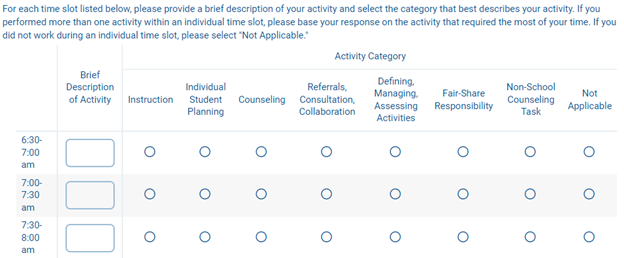A significant part of Allen County’s sustainability plan—as part of their Project Prevent Cohort 3 (P2C3) grant—is to build the capacity of school based mental health staff in the district to better meet student and family mental health needs. As a first step to building capacity, the county has begun conducting “time studies” to evaluate how school counselors are spending their time.
According to the American School Counselor Association (ASCA), 80% of school counselors’ time should be spent in direct or indirect service to students. These time studies will help gauge whether Allen County schools are meeting this expectation, and, if not, what kind of resources and support may be needed to do so. The first set of time studies were completed this past fall. Each school counselor in Allen County tracked their time in 30-minute increments during a 10-consecutive workday period. The counselors provided brief descriptions of what they did and flagged the activity for certain activity categories as provided by ASCA. See an example of the time study form below:

The tracker itself is made from a survey software called Alchemer and is very user friendly. The idea is to minimize the burden on counselors by capturing only the information needed and collecting data for only 10 days of the semester. They made sure to avoid testing windows and breaks, so that the data was representative of a typical work week. Feedback from counselors has been positive: the survey is quick and manageable, and they understood the importance of the data to advocate for counselors’ time.
Context was key to gaining buy-in from staff. Work was done on the front end to ensure counselors understood the purpose of the time studies; the data will inform the superintendent and principals in the district of the reality of how school counselors are spending their time.
Allen County plans to conduct time studies once a semester for each year of the grant, and the goal is that over time, more and more of counselors’ time will be spent in direct or indirect service to students as opposed to non-school counseling tasks.
